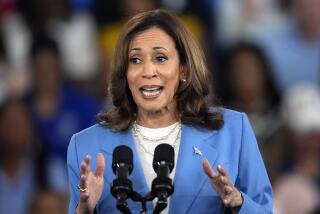McCain Pushes Conservative Goals in S.C.
- Share via
SPARTANBURG, S.C. — On the eve of his meeting with Democratic presidential contender Bill Bradley to discuss campaign finance reform, Republican John McCain told voters in this key primary state that the influence of big money in Washington is blocking conservatives from achieving their political goals.
Five years after Americans elected a GOP Congress, McCain said that conservatives have learned that “talking about our agenda”--cutting taxes, providing school choice to parents, cutting wasteful spending--”is the easy part.”
“The reality is that passing these reforms won’t occur until we take on the entrenched power of the special interests,” he said in a speech Wednesday at Converse College. “As conservatives, our priority must be to give the government back to the people. But in Washington, success is no longer defined by the passage of either party’s agenda but by the size of our campaign committee war chests.”
McCain, a senator from Arizona, originally planned a speech on Social Security policy Wednesday. But he switched the topic after he and Bradley, a former senator from New Jersey, agreed recently to appear together today in New Hampshire as a demonstration of their bipartisan opposition to the corrupting influence of big money in Washington.
“Bill Bradley is a liberal Democrat; I am a proud conservative Republican,” McCain said. “We disagree on almost everything. But one issue on which we do agree . . . is that politics is broken.”
Trying not to be left out of the event, Democratic candidate Al Gore bought a full-page ad in a local New Hampshire newspaper today. It praises McCain’s courage for “taking on his own party” by supporting campaign finance reform, and it credits Vice President Gore as an activist on the issue too. It does not mention Bradley, Gore’s rival.
In South Carolina, McCain’s speech signals a stepped-up effort by his campaign in a state where voting will closely follow the nation’s first presidential primary in New Hampshire on Feb. 1. Every Republican who has won the South Carolina primary since 1980--Ronald Reagan, George Bush and Bob Dole--has become the GOP nominee. The primary is scheduled for Feb. 19.
The latest polls show McCain leading front-runner George W. Bush by 7 percentage points in New Hampshire. But the Texas governor has a wide lead over McCain in South Carolina. A poll last month found Bush ahead by 62% to 15%.
McCain aides think his support in South Carolina will jump when more voters get to know him in town hall meetings like the gathering at Converse College. But the senator also acknowledged to reporters that the stakes are high in the state.
McCain said South Carolina is so important to his campaign--”Similar to the landing at Normandy,” he quipped--that “win South Carolina, win South Carolina” has become a mantra for his staff.
“My chances [of being the GOP nominee] would be dramatically diminished if I didn’t win here,” he said. Asked if he would drop out of the race if he did not win the state, McCain said he might be able to weather a strong second place.
“Nothing is ever over,” he said. “But it’s critical.”
Bush’s campaign also signaled the increased attention on South Carolina Wednesday by issuing a quick response to McCain’s speech that was critical of the senator’s views on campaign finance reform.
McCain wants Congress to ban contributions by political action committees and stop unlimited “soft money” contributions to political parties. Soft money is not regulated or restricted the same way as donations made to a candidate.
Bush complained that McCain’s recent bill regarding campaign finance reform could hurt Republicans because it did not prevent traditionally Democratic labor groups from using union dues to pay for advertising campaigns or grass-roots activity.
But McCain said he supports legislation to block such union activity, even though it was not included in the bill he co-wrote earlier this year.
McCain, in his speech, said campaign finance reform was necessary to achieve Republican goals. He said, for example, that tax breaks for average Americans are taking a back seat to loopholes for “check-writing special interests.”
“I think most Republicans understand that soft money corrupts our political ideals,” he said. “As long as special interests dominate, they will dominate legislation as well.”
McCain’s campaign finance plan, though it has roused voters in New Hampshire, did not seem to have the same ring in South Carolina.
Voters answered his ethical crusade with questions about moral issues--like the role of religious schools in voucher programs, which McCain supports--or questions from veterans about issues like the U.S. transfer of the Panama Canal (McCain got cheers when he said the United States should never have promised to do it).
*
Times political writer Ronald Brownstein contributed to this story.
More to Read
Get the L.A. Times Politics newsletter
Deeply reported insights into legislation, politics and policy from Sacramento, Washington and beyond. In your inbox twice per week.
You may occasionally receive promotional content from the Los Angeles Times.










